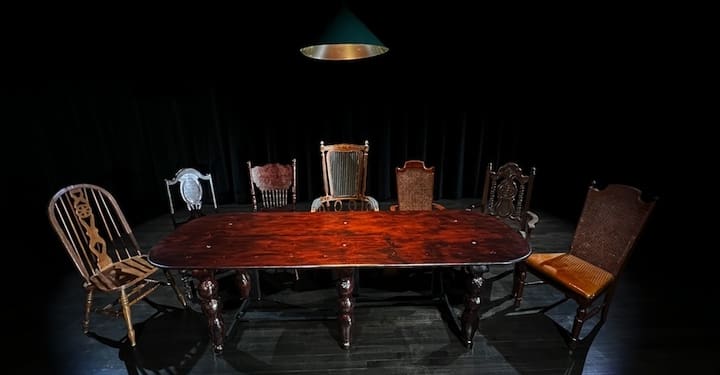SCHENECTADY — Tanya Deptola shares concern over how her production of Friedrich Gorenstein’s play “Berdichev / The Family That Never Was” will be received by an American audience. It’s not a musical, she said. It’s not a comedy, either. It’s a drama, she said. It’s tragic.
The New Russia Cultural Center has tried three times to bring Gorenstein’s play to a local stage. Deptola, the president of the non-profit organization, said they were denied from obtaining the necessary funding. At one point, the grantors turned them away, dismissing the cultural center for “just wanting to show the play to our small group.” That’s when her stage manager had an idea.
Ron Miller, who had been applying for the grants, submitted another proposal. Let’s have two casts for two different shows, he said. One in English and another in Russian.
It worked.
Since forming in 2005, the New Russia Cultural Center has focused to expand the public’s understanding and appreciation of Russian folk arts and Russian-American history. The center stands to stimulate public interest in Russian culture through educational activities and exposure to Russian folk arts.
The Russian-speaking community includes people of different nationalities, such as Russian, Ukrainian, Belarusian, Jewish, Latvian, Tatars and others,” Deptola said. By her count, she said there are about 12,000 Russians in the Capital District. “Not all of them are with the center,” she said. Many flock to the center’s annual Winter Festival, its largest event of the year. Some, she added, have lost their ties since coming to America. The Russian language is what connected all emigrants from the former Soviet Union during the last 25 years.
Berdichev is a city in Central Ukraine where Nazi invaders, intent on genocide during the Second World War, eliminated the entire Jewish population. Following the Holocaust, Gorenstein witnessed the decline and diminishment of Jewish culture and character in Soviet society. He selected Berdichev as a symbolic Jewish town for the play, and based the characters on his own family and memories.
Gorenstein’s early life shaped him into a wordsmith whose work turned a critical eye on Stalinism and anti-Semitism. His parents, Naum and Enna, were both educators. The future playwright was born in 1932, a pivotal year in which a horrible famine resulted in the death of an estimated 10 million Ukrainians. History places blame on the mismanagement or resources. While the region continuously struggled for independence from the Soviet Union, there are others who blame Joseph Stalin’s regime for conducting a genocide. Gorenstein’s father was arrested by authorities in 1935. He died two years later as he attempted to escape from the gulag to which he was sent.
Religious ideology was stripped away within Stalin’s Soviet Union. In Berdichev, whose population was once 80 percent Jewish, synagogues were converted to community centers. Gorenstein’s mother, who became a director of a home for juvenile offenders, changed her son’s name, concealing his heritage. In 1941, Nazi Germany invaded Ukraine. Gorenstein and his mother escaped Hitler’s death squads by evacuating into the Ural Mountains. Enna died of tuberculosis in 1943, after which Gorenstein was sent to an orphanage before he returned to Berdichev to be raised by his aunts, Zloty and Rachel at the war’s end.
Casting for the play’s 16 characters began last October. Miller, the play’s stage manager, said the task took several weeks to complete. For every character, they had to assign two actors.
The play presents 30 years in the everyday life of a Jewish family from 1945 to 1975, as two sisters, Rachel and Golda, guide their family through hard years of poverty and strife. It is an unsentimental story about post-Holocaust Jews, separated from their culture, history and people, who nonetheless survive through laughter and tears.
Miller said this adaptation of Berdichev promises to highlight the pain and experience of life immediately following the horrific events of the Holocaust. The topic matter, however, is not exclusive to Jews. Deptola said the common themes of the play are loss and family. Promotional material focuses on a dinner table surrounded by empty chairs — each one obtained from a different set.
“It’s a very popular play,” he said, “because it’s so funny but you also want to cry. It just swings back and forth. It’s a beautiful play.”
Deptola said the intended aim of performing Berdichev is to give the audience a broader perception of themselves, immersing them in a different time and culture to instill new insights into the history and human connections across time.
“We hope to use this opportunity to generate a collaborative community effort that might renew awareness of the Holocaust to a younger generation of Americans,” she said, “and help examine its impact on 21st-century life.”
IF YOU GO:
What: Friedrich Gorenstein’s “Berdichev / The Family That Never Was”
When: 7 to 9:30 p.m., Friday, Jan. 14 and Saturday, Jan. 22 [in English]; 7 to 9:30 p.m., Friday, Jan. 21 [in Russian]
Where: Neil and Jane Golub Theater @ Adeline Wright Graham Boys & Girls Club of Schenectady, located at 104 Education Drive, Schenectady, NY 12303
How much: $18/online at www.eventbrite.com, $20/ at the door, $10/students & senior citizens



